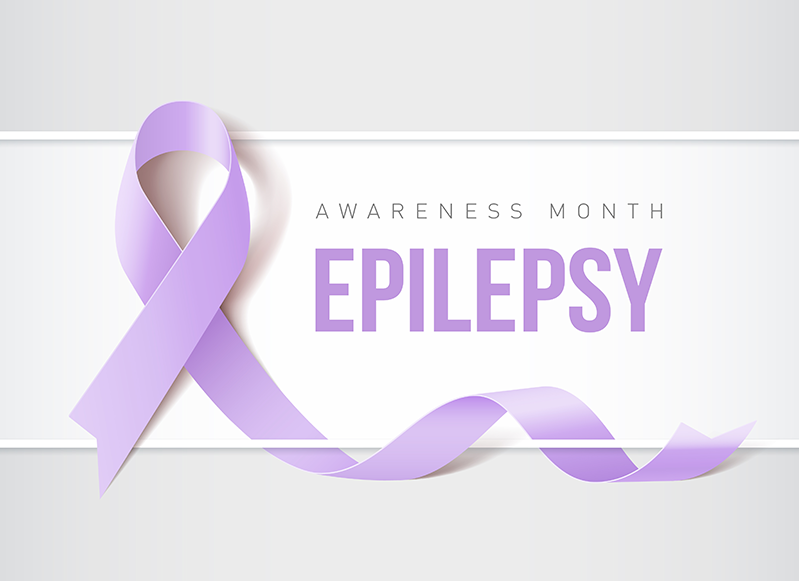November is National Epilepsy Awareness Month. Epilepsy is a neurological condition that causes seizures, but not everyone with epilepsy experiences seizures. There are other symptoms that they may experience instead. Because there are a lot of misconceptions and misunderstandings regarding epilepsy, November is the perfect time to talk about it and clear the air. One in 10 people will experience a seizure within their life time, and one in 26 people will be diagnosed with epilepsy. It is a very common condition that affects over 3 million people in the United States.
Basics of Epilepsy
When a person has epilepsy, certain chemical and electrical activity in the brain is disturbed which can cause seizures. It affects people at every age and every ethnic background. While seizures are a common symptom of epilepsy, other behaviors can also occur such as shaking, wandering about, chewing quickly, staring blankly into space, walking in circles, confusion, and more. This is because epilepsy affects different parts of the brain. What makes epilepsy a tricky disorder is the fact that the cause varies and is sometimes unknown. It can be inherited, it can be caused by brain damage, or it is caused by a multitude of other reasons. A Las Vegas neurologist may be able to help you find the cause of your condition.
Learn the Specifics
If you know someone with epilepsy, here are several details you may want to learn about their condition specifically:
- Do they take anti-epileptic medication? If so, when do they take them and how often?
- Do they have a medical bracelet, identification card, or jewelry with information on how to help them?
- What type of seizures do they experience and how often do they usually occur?
- How long do their seizures last and are they triggered by something such as stress, sunlight, smoke or scents?
- Do they recover from their seizure quickly and is there anyone they would like for you to notify?
It’s a good idea to learn about epilepsy, especially if you know someone with the condition. Epilepsy is a chronic condition that can be challenging at times. Help the individual by informing yourself about the condition. Put their mind at ease, expand your knowledge, and study some of these useful tips.
Types of Seizures
There are two types of seizures that affect the brain: generalized seizures and focal seizures. Generalized seizures affect both sides of the brain and come in two forms:
- Absence seizures – causes rapid blinking or staring into space
- Tonic-clonic seizures: can cause a person to lose consciousness, fall, cry, jerk or experience muscle spasms
Focal seizures occur in just one area of the brain and include three types:
- Simple focal seizures – causes twitching or a change in taste or smell
- Complex focal seizures – causes confusion and prevents the individual from responding
- Secondary generalized seizures – begins in one part of the brain but spreads to both sides
Seizures can last anywhere from a few seconds to a few minutes. They may look different than how one would expect, so it is good to learn how to recognize difference types of seizures.
What to Do When Someone Has a Seizure
- Make sure the person is safe and do not leave them until after they have recovered
- If they are experiencing convulsions, turn them on their side
- Cushion their head and help loosen any tight clothing that may get in the way
- Avoid putting anything in their mouth or holding them down
- Look for any identification card or medical jewelry they may be wearing
- Begin timing their seizure; if it lasts longer than five minutes, call 911
After a seizure, it is important to stay with the person and reassure them of their safety. They may be disoriented and frightened. Explain what happened and offer your assistance.
Life with Epilepsy
Although epilepsy is a life-changing condition, most people with epilepsy can still live completely normal lives. Most people with epilepsy can participate in activities that people without the condition participate in. While they may face more challenges, they can still go to school, work, and travel. It may take some time to adjust to specific necessities, but for the most part, people with epilepsy lead regular lives.
Treatment for Epilepsy
Epileptic seizures can be controlled with medication but it would have to depend on a few factors. Medication will vary depending on age, health, how often seizures occur, and how severe they are. 70% of people control their seizures through medication. If you are considering medication for your epileptic seizures, it may be a good idea to see a Las Vegas neurologist. Dr. Christopher Milford at Silver State Neurology can assist with treating symptoms of epilepsy. Other treatment options can include surgery, vagus nerve stimulation, or even through a ketogenic diet. Consult a neurologist in Las Vegas for treatment options today.


